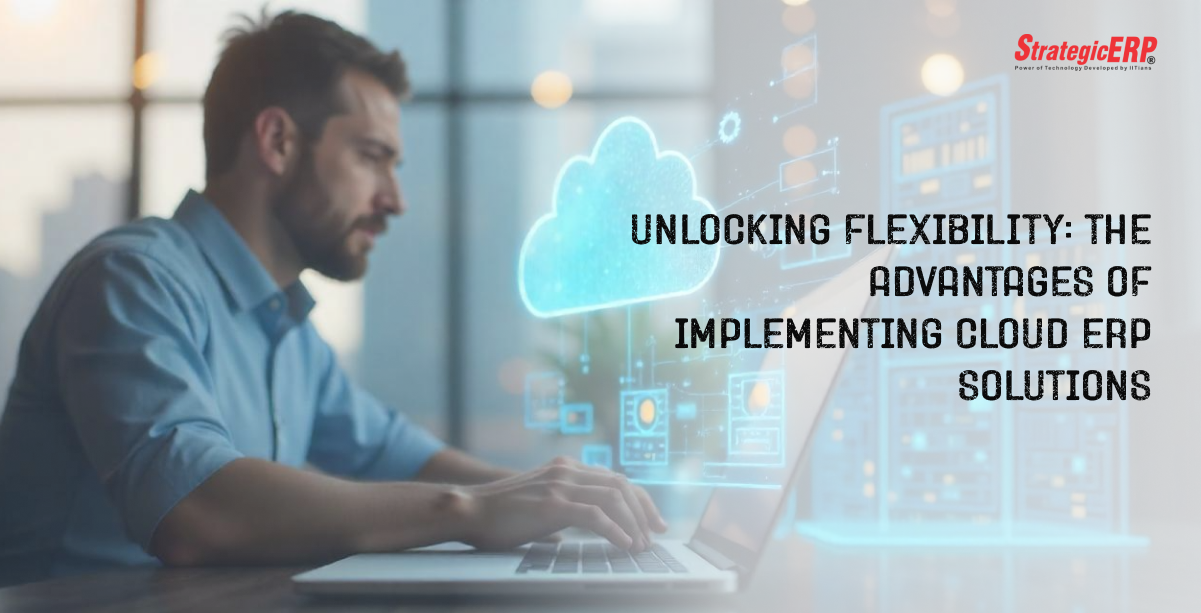Unlocking Flexibility: The Advantages of Implementing Cloud ERP Solutions
Category : ERP
Blog posted by : Admin / 02 Apr, 2025
In the fast-paced business world of today, businesses require flexible, scalable, and efficient solutions to remain competitive. Cloud ERP solutions have proven to be a game-changer, providing businesses with the ability to respond to evolving market needs while streamlining operations. From construction to manufacturing to healthcare, Cloud-based ERP systems enable organizations with real-time information, automation, and integration.
This blog discusses the revolutionary advantages of Cloud ERP software, specifically how sectors such as construction and infrastructure can use the top Infrastructure ERP solutions to fuel growth.
We’ll also highlight how StrategicERP—a leader in construction ERP software—helps businesses achieve operational excellence.
What Is a Cloud ERP Solution?
Image source: HapyCo
A Cloud ERP solution is a web-based enterprise resource planning system that centralizes business processes—finance, inventory, HR, procurement, and project management—into a single, unified platform.
In contrast to on-premise ERP, Cloud ERP runs on remote servers with the advantage of any time, anywhere access and low IT overhead. For sectors such as construction, industry-specific tools like construction ERP software offer customized features—project monitoring, resource planning, and compliance management—making them indispensable for contemporary business.
The Importance of Cloud ERP in Modern Businesses
You know that modern businesses require agility, cost-effectiveness, and data-driven decision-making elements that Cloud ERP software provides. The main benefits are:
Image source: Cloud Hosting Cloudoye
-
Scalability: Scale up to business expansion without significant infrastructure investments.
-
Cost Savings: Remove the initial hardware cost with a subscription solution.
-
Remote Accessibility: Access key information on the move, increasing workforce flexibility.
Applications like construction greatly gain from Cloud ERP adoption, such as StrategicERP's demo of construction ERP software that exhibits real-time project analytics and AI-based automation.
Key Features of Cloud ERP Solutions
Learning about the key aspects of Cloud ERP solutions enables organizations to make informed choices. These solutions are engineered to manage operations in an efficient manner while providing state-of-the-art functionalities.
Image source: FasterCapital
1. Scalability and Customization
Cloud-based ERP systems enable companies to scale modules according to requirements. StrategicERP's best Infrastructure ERP, for example, provides custom workflows for construction companies to seamlessly fit into project requirements.
2. Real-Time Data Access
It goes without saying that stakeholders have real-time access to financials, inventory, and project status through Cloud-based ERP, enhancing responsiveness.
3. AI-Driven Automation
AI-driven ERP software streamlines routine work—invoice processing, payroll, and compliance checks—freeing resources for strategic initiatives.
4. Seamless Integration with Other Software
Cloud ERP solutions are integrated with CRM, BI tools, and IoT devices, providing a single business ERP system.
Business Benefits of Implementing Cloud ERP
Image source: Sage Software Solutions
The benefits of Cloud ERP software go beyond technology—they change the way businesses function. From cost savings to security, the advantages are irresistible.
1. Enhanced Operational Efficiency
Workflow automation minimizes human errors and speeds up processes. StrategicERP's construction ERP software streamlines procurement and labor management, reducing delays by 30%.
2. Cost Savings and Resource Optimization
The Pay-as-you-go method minimizes capital expenditures. A Cloud ERP implementation exposes that businesses save 20-30% on IT expenses.
3. Enhanced Data Security and Compliance
Encryption, multi-factor authentication, and periodic updates guarantee data security—essential for sectors such as healthcare and construction.
4. Remote Accessibility and Workforce Flexibility
With Cloud ERP software, teams work together from anywhere, enhancing productivity.
5. Better Decision-Making with Data-Driven Insights
Real-time analytics support leaders in making smart decisions. StrategicERP's best Infrastructure ERP provides profitability dashboards to track project profitability.
Industry-Wide Impact of Cloud ERP Solutions
Various industries utilize Cloud ERP solutions differently, adapting them according to industry challenges. The adaptability of such systems makes them precious across verticals.
1. Construction & Infrastructure
Construction ERP software enables streamlined project management, cost monitoring, and compliance. A construction ERP software demo features AI-based risk assessment software.
2. Real Estate & Property Management
Cloud ERP supports lease management, maintenance scheduling, and accounting reporting.
3. Manufacturing & Supply Chain
ERP software enables inventory optimization and demand forecasting.
4. Healthcare & Smart City Management
Patient records, asset tracking, and regulation compliance become easier with Cloud ERP solutions.
Overcoming Challenges in Cloud ERP Implementation
Although Cloud ERP software has limitless advantages, implementation challenges have to be overcome by businesses. They can be assuaged through proper planning and professional guidance.
1. Data Migration and System Transition
Implementing in stages reduces disruption. StrategicERP ensures smooth data migration assistance.
2. User Training and Adoption
Interactive training facilitates easy onboarding.
3. Customization and Integration Challenges
Selection of the appropriate Infrastructure ERP that has open and flexible APIs eliminates compatibility issues with current tools.
Conclusion
The move to Cloud ERP solutions is no longer a choice—it's a business imperative for companies striving toward growth and efficiency. The correct system has the power to transform operations from automation to real-time decision-making.
Cloud ERP solutions are revolutionizing business operations by offering scalability, cost-effectiveness, and real-time insights.
For construction firms, StrategicERP's construction ERP software is the top Infrastructure ERP with AI, automation, and industry experience combined. Through the adoption of Cloud ERP deployment, companies achieve unmatched agility, setting them up for sustained success.
Frequently Asked Questions (FAQs)
1. What is a Cloud ERP solution?
A Cloud ERP solution is a web-based software system that centralizes business processes like finance, inventory, and HR, offering real-time data access and automation.
2. How does Cloud ERP improve business flexibility?
Cloud ERP enables remote access, scalability, and seamless integration, allowing businesses to adapt quickly to changing demands.
3. Is Cloud ERP secure for business data?
Yes, Cloud ERP solutions use advanced encryption, multi-factor authentication, and regular updates to ensure high-level security.
4. What industries benefit the most from Cloud ERP?
Industries like construction (using construction ERP software), real estate, manufacturing, EPC, ceramic and healthcare benefit significantly.








